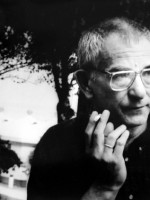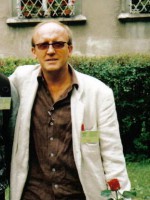Dariusz Jabłoński is a Actor, Director, Scriptwriter, Producer and Assistant Director Polonais born on 30 may 1961

Dariusz Jabłoński (born 1961) is a Polish film director and producer, president of his own production company, Apple Film Productions, and one of the leading independent producers in Poland.
In 1990 he founded Apple Film Productions, which has produced more than 21 documentaries, 15 feature films and numerous tele-plays. Most of these were co-produced by Polish Television, Canal+, WDR, ARTE as well as other international producers. Additionally, many of these productions have received myriad international film awards.
Jabłoński is a founder of the Polish Film Awards and the Polish Film Academy as well as of the Independent Film Foundation, created to promote Art House films and their writers. The Independent Film Foundation is also running "ScripTeast", an innovative training program designed specifically for experienced scriptwriters from Eastern and Central Europe. He has finished many special courses (ex. European Film College) and received many international scholarships for European film professionals. He is also a member of the European Film Academy.
Source : Wikidata
Dariusz Jabłoński

Biography
Jabłoński is a graduate of the Film Directing Academy in Łódź, Poland. He has worked on the biggest films in Polish cinematography –- as a Second Director on "Decalogue" by Krzysztof Kieślowski and as First Assistant Director on the "White Visiting Card" and "Magnate" by Filip Bajon. He produced and directed "The Visit of an Elderly Lady" (1986) -- the first Polish independent film—and Photographer (1998), which received a number of international film awards: Grand Prix FIPA D'OR and Prix Planete in Biarritz (1999); Grand Prix VPRO Joris Ivens Award at IDFA in Amsterdam (1998); Prix Europa for Best Non-fiction TV Program (1998); Best Documentary in Banff (1999); Best Documentary at Double Take, Durham; Grimme Prize in Germany (2000); Bavarian TV Prize (1999). His work has also been screened at the TOP TEN Mediaforum Conference in Cologne. In addition, he has won awards at many international and Polish film festivals.In 1990 he founded Apple Film Productions, which has produced more than 21 documentaries, 15 feature films and numerous tele-plays. Most of these were co-produced by Polish Television, Canal+, WDR, ARTE as well as other international producers. Additionally, many of these productions have received myriad international film awards.
Jabłoński is a founder of the Polish Film Awards and the Polish Film Academy as well as of the Independent Film Foundation, created to promote Art House films and their writers. The Independent Film Foundation is also running "ScripTeast", an innovative training program designed specifically for experienced scriptwriters from Eastern and Central Europe. He has finished many special courses (ex. European Film College) and received many international scholarships for European film professionals. He is also a member of the European Film Academy.
Usually with
Filmography of Dariusz Jabłoński (17 films)
Actor

Decalogue VII (1990)
, 55minutesDirected by Krzysztof Kieślowski
Genres Drama
Actors Anna Polony, Dariusz Jabłoński, Bogusław Linda, Artur Barciś, Bożena Dykiel
Roles Wojtek's Friend
Rating77%





Prior to the events of the film: Ewa is the mother of 22-year-old Majka. She was unable to have any more children after Majka, although she would have liked to. She became head-mistress of a school where she hired a literature professor, Wojtek. Wojtek met and fell in love with then-16-year-old Majka, who got pregnant and had a daughter, Ania. However, due to the 'scandal' of it all, Majka was forced to pretend that Ania was actually her little sister rather than her daughter, and Wojtek avoided charges for seducing a minor by simply walking away.
Director

Photographer (1998)
, 52minutesDirected by Dariusz Jabłoński
Genres War, Documentary, Historical
Themes Films about racism, Films about religion, Documentary films about racism, Documentary films about law, Documentary films about war, Documentary films about historical events, Documentaire sur une personnalité, Documentary films about religion, Political films, Films about Jews and Judaism, Documentary films about World War II
Actors Artur Brauner
Rating72%





Scriptwriter

Photographer (1998)
, 52minutesDirected by Dariusz Jabłoński
Genres War, Documentary, Historical
Themes Films about racism, Films about religion, Documentary films about racism, Documentary films about law, Documentary films about war, Documentary films about historical events, Documentaire sur une personnalité, Documentary films about religion, Political films, Films about Jews and Judaism, Documentary films about World War II
Actors Artur Brauner
Rating72%





Producer
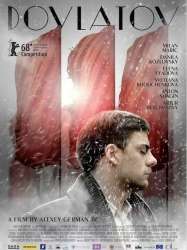
Dovlatov (2018)
Directed by Alexeï Guerman Jr
Origin Russie
Genres Drama, Biography
Actors Milan Marić, Danila Kozlovski, Anton Shagin, Elena Lyadova, Svetlana Khodtchenkova, Piotr Gąsowski
Roles Producer
Rating63%





URSS, 1971. Six jours dans la vie de l’auteur Sergei Dovlatov, qui se bat pour écrire avec intégrité malgré l’écrasante censure imposée par le régime soviétique.

Under Electric Clouds (2015)
, 2h18Directed by Alexeï Guerman Jr
Origin Russie
Genres Drama, Science fiction
Actors Merab Ninidze, Tchoulpan Khamatova, Piotr Gąsowski, Vanessa Scalera, Davide Iacopini
Roles Producer
Rating62%





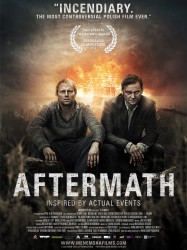
Aftermath (2012)
, 1h47Genres Drama, Thriller
Themes Films about religion, Political films, Films about Jews and Judaism
Actors Maciej Stuhr, Jerzy Radziwiłowicz, Zuzana Fialová, Zbigniew Zamachowski, Danuta Szaflarska
Roles Producer
Rating72%





The film is a contemporary drama. It takes place in the fictional village of Gurówka in 2001. The story begins with the return of Franciszek Kalina (Ireneusz Czop) to his hometown in rural Poland after having lived in Chicago for decades. He learns that his brother Józef (Maciej Stuhr) is shunned by the community for acquiring and displaying on his farmland dozens of Jewish tombstones which he discovered had been used by German occupying forces as paving stones in a now abandoned road. Józef is gathering the tombstones everywhere in the settlement and moves them into his own field to survive from oblivion. Against the growing opposition of the town residents, the Kalina brothers attempt to learn more about what happened to the Jews of the village. Their personal relationship, harsh after the brothers met, warms and becomes more cooperative after they both find themselves opposed by the whole village. The older priest blesses the brother and urges him to continue gathering the tombstones while the new one, to head the parish soon, displays no sympathy for Jews. Franciszek discovers in a local archive that his father along with other men of the village got the land that had been owned by Jews before the war. He is eager to study the truth. After speaking to some of the oldest residents in the village, they later realize that half the residents murdered the other half (led by a neighbor and their father Stanisław Kalina). This discovery results in a terrible fight and split between the brothers after a dispute about the bones of the Jews they found the night before. Józef, after learning that their own father was directly involved in the murder of the Jews who were burned to death in Józef's family's former house, the brother's roles are reversed and it is Józef that wants to hide the truth from coming out to the world and Franciszek that wants all the world to know the truth and for the bones of the murdered Jews to be taken to their wheat fields and buried with their headstones, so as to not compound the terrible sins of their father and the neighbors. In their fight, Franciszek comes close to killing his brother Józef but Franciszek stops himself, puts the ax down and leaves the village but is returned to the village by a hospital nurse/doctor, the daughter of one of the oldest surviving neighbors who had known the truth but kept it secret, to see his brother beaten, murdered and crucified in their own yard. The movie ends with a scene of a group of young and older Israeli Jews being led by an Orthodox Rabbi reciting the Kaddish, the Jewish prayer in memory of the dead, in front of a formal memorial stone, at the now restored cemetery that Józef had made in his fields, while Franciszek watches with respect, lights a candle, leaves it on one of the tombstones and nods slightly to the scene, turns and walks away, satisfied that these Jews are now buried where their lives and their deaths, can be remembered and honored, while at the same time, lighting a candle, in remembrance and in honoring his own brother, Józef who was crucified by unknown neighbor(s), symbolically dying for the sins of his father and the neighbors.
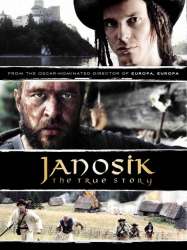
Janosik: A True Story (2009)
, 2h17Directed by Agnieszka Holland, Katarzyna Adamik
Genres Drama, War, Romance
Actors Michał Żebrowski, Danuta Szaflarska, Jarosław Boberek, Joanna Kulig, Małgosia Bela, Maja Ostaszewska
Roles Producer
Rating50%





XVIII siècle. Janosik a passé sa jeunesse dans l'armée et il a été confronté à la violence, à la cruauté et à l'injustice. En rentrant chez lui, il rejoint une bande de brigands. Intrépide, charismatique et guerrier habile, il s'impose très vite comme leur chef. Volant les riches pour redistribuer aux plus démunis, magnanime, laissant la vie sauve à ses victimes, il devient rapidement très populaire dans la région. Mais son insolent succès réveille des haines et des jalousies : désormais, son existence est menacée....
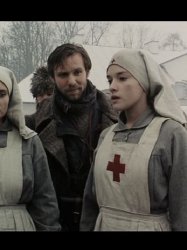
Wrota Europy (1999)
, 1h13Actors Alicja Bachleda-Curuś, Kinga Preis
Roles Producer
Rating60%





In January 1918, three volunteer nurses came to the field hospital and Polish Corps located in the manor in Ciechiniczach (Cichiniczach) between Rahačoŭ and Bobrujskiem. Sophie, one of the nurses, finds her previously missing brother. When the hospital gets into the hands of the Bolsheviks, the sisters must cope not only with patient care, but also the brutality of the enemy soldiers.

Photographer (1998)
, 52minutesDirected by Dariusz Jabłoński
Genres War, Documentary, Historical
Themes Films about racism, Films about religion, Documentary films about racism, Documentary films about law, Documentary films about war, Documentary films about historical events, Documentaire sur une personnalité, Documentary films about religion, Political films, Films about Jews and Judaism, Documentary films about World War II
Actors Artur Brauner
Roles Producer
Rating72%





Director
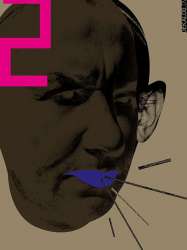
Decalogue II (1990)
, 57minutesDirected by Krzysztof Kieślowski
Genres Drama
Themes Pregnancy films, Medical-themed films, Films about sexuality
Actors Krystyna Janda, Aleksander Bardini, Olgierd Łukaszewicz, Artur Barciś, Stanisław Gawlik, Piotr Fronczewski
Roles First Assistant Director
Rating77%





The episode focuses on two people: an elderly doctor (Aleksander Bardini), who lives alone in the ubiquitous Dekalog apartment block and works in a local hospital; and Dorota Geller (Krystyna Janda), a violinist with the Philharmonic Orchestra, who is in her 30s and lives in the same building.

Decalogue III (1990)
, 56minutesDirected by Krzysztof Kieślowski
Genres Drama, Romance
Actors Daniel Olbrychski, Joanna Szczepkowska, Artur Barciś, Henryk Baranowski
Roles First Assistant Director
Rating2%





It is Christmas Eve. Janusz (Daniel Olbrychski), a taxicab driver, plays Święty Mikołaj (roughly equivalent to Santa Claus) for his children and then comes home as himself (crossing paths briefly with Krzysztof from Decalogue I) to his wife and children, in order to spend the evening with them. They attend mass in the city. There he spots Ewa (Maria Pakulnis), with whom he had an affair three years earlier. Ewa just happened upon the church after visiting her senile aunt in the retirement home (the aunt asks Ewa whether she's done her homework, but also enquires after her husband).

Decalogue IV (1990)
, 56minutesDirected by Krzysztof Kieślowski
Genres Drama
Actors Janusz Gajos, Aleksander Bardini, Artur Barciś, Igor Śmiałowski, Andrzej Chyra
Roles Assistant Director
Rating2%





Anka (Adrianna Biedrzyńska), an attractive acting student, lives with her father, Michal (Janusz Gajos). Her mother has been dead since Anka was born. They get on well together and their relations are more like those between two friends rather than a father-daughter relationship. Michal often travels abroad on business trips and Anka does not feel very happy at home without him.

Decalogue IX (1990)
, 58minutesDirected by Krzysztof Kieślowski
Genres Drama, Romance
Actors Ewa Błaszczyk, Artur Barciś, Jerzy Trela
Roles Assistant Director
Rating80%





Dr. Roman Nycz (Piotr Machalica) has been diagnosed with impotence. His friend and colleague confirms the prognosis, suggesting that he should divorce his attractive young wife, Hanka (Ewa Błaszczyk), a stewardess for KLM. After discussing the diagnosis, it becomes clear that the couple is in love and do not want to lose each other. Hanka offers that there are more important things in a relationship between two people than sex and that she will manage to live without it. Roman, although guarded and hurt, says that he would not begrudge her decision to find another lover if she does not already have one. She halfheartedly refuses and asks that they refrain from discussing the situation at length.
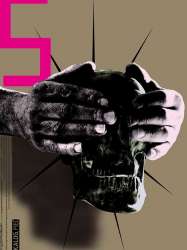
Decalogue V (1990)
, 57minutesDirected by Krzysztof Kieślowski
Genres Drama, Crime
Themes Films about capital punishment
Actors Mirosław Baka, Artur Barciś, Krystyna Janda, Krzysztof Globisz, Zbigniew Zapasiewicz, Olgierd Łukaszewicz
Roles Assistant Director
Rating2%





The film begins with Piotr Balicki (Krzysztof Globisz), a young and idealistic lawyer who is about to take the bar exam. Jacek Łazar (Mirosław Baka) is a 20-year-old man, coming from the countryside. He wanders the streets of Warsaw and has apparently nothing to do. He keeps asking about a taxi stand but the first one he finds is very busy. Waldemar Rekowski (Jan Tesarz), a middle-aged taxicab driver, overweight, cruel-looking, lives in the Dekalog apartment block. He enjoys the freedom of his profession, with a wage and the power to ignore people whom he does not want to take in his taxi, as well as ogling young ladies.
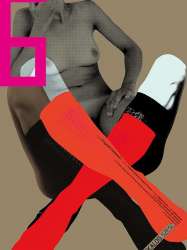
Decalogue VI (1990)
, 58minutesDirected by Krzysztof Kieślowski
Genres Drama
Actors Olaf Lubaszenko, Grażyna Szapołowska, Artur Barciś, Stanisław Gawlik
Roles Assistant Director
Rating85%





Tomek (Olaf Lubaszenko) is a nineteen-year-old orphan, living with the mother of a friend and working at the local post office. He has been observing an attractive woman in her thirties, Magda (Grażyna Szapołowska), and fallen in love with her. He sends false notices from the post office to her, calling her to pick up money which does not exist, just to see her. In the evenings, he spies on her through a telescope, as she lives in an apartment opposite his, and calls her frequently. Magda sees many men in her apartment and Tomek manages to ruin her dates by calling the gas service to check a leak.
 Connection
Connection
